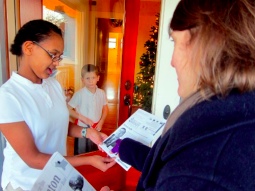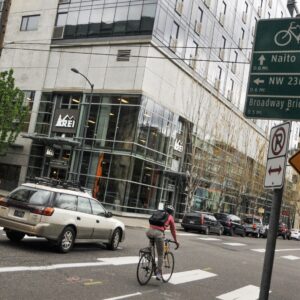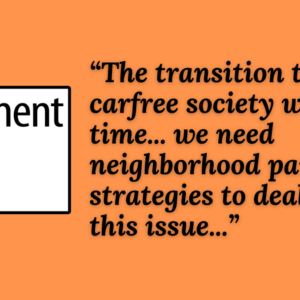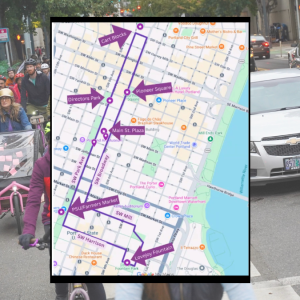
in the Kenton neighborhood.
(Photo courtesy Portland Afoot)
While we hear a lot about convenience and safety issues, the fact is a lot of people drive because it’s the only thing they know. A lack of information about biking, walking and transit options is often the main barrier that keeps people from trying it out. (This is why PBOT works so hard on their SmartTrips marketing program.)
Now, local media non-profit Portland Afoot has a plan to further bridge that information gap. Publisher Michael Andersen got in touch with us over the weekend to share an exciting new product he has put together with two local Realtors

The Realtors, Tatiana Xenelis and Wren Shiffler specialize in selling “car-lite housing” and like any smart business people they are always looking for new ways to market their services. Hence the partnership with Andersen and Portland Afoot. The trio teamed up for a pilot delivery to 500 homes in the Kenton neighborhood last month.
The one-page info sheet is hand-delivered by Xenelis and Shiffler, giving them a perfect opportunity to chat with homeowners and get new leads. For his part, Andersen sells ads in the publication to nearby businesses. It’s a great idea.
Andersen calls their new product a “one-page introduction to low-car life.” It highlights the area’s WalkScore, the locations of nearby Zipcars, and much more. Here’s more from Andersen:
“It serves an important need for consumers. People who are new to town or to low-car life (or both) tend to have a very vague idea of the quality of nearby bus and bike networks. This product is a simple, concise, upbeat guide to the basics: the ups and downs of each local bikeway, the location of the nearest bike shops, the frequency of each bus line, etc.”
Residential real estate and a low-car lifestyle are an important nexus for Andersen. With two successful years doing Portland Afoot, he’s convinced that the “home location decision” deserves a lot more attention from policymakers:
“… the people who succeed in living low-car lives are the ones who prioritized it while they were looking for apartments or houses. This publication makes it easier for people to understand which homes are valuable because they’re well-connected [to transit and biking routes].”
I love this concept. It seems like a low-cost, DIY, privately funded, entrepreneurial version of PBOT’s SmartTrips program.
Andersen says the Kenton neighborhood was just a pilot and he and Xenelis and Shiffler would love to know where they should go next. Want to see this low-car infosheet come to your area? Drop Michael a line at michael [at] portlandafoot [dot] org.







Thanks for reading.
BikePortland has served this community with independent community journalism since 2005. We rely on subscriptions from readers like you to survive. Your financial support is vital in keeping this valuable resource alive and well.
Please subscribe today to strengthen and expand our work.
I think the involvement of realtors and their “walkscore” marketing tool speaks to the overly strong link between portland-style transportation advocacy and gentrification (of which Kenton is a relevant example). I am an enthusiastic supporter of a car free life style but I want nothing to do with dues paying members of the monopoly that helped inflate housing prices to an unsustainable level.
any way to get the info out to people is good… hopefully it’s presented well enough to get people to read it…
Thanks for the coverage, Jonathan! I’d only add that this was definitely a collaboration with Tatiana and Wren, who were a big part of putting the plan together.
Spare_wheel, that’s a fair criticism, but in the long run, there is nothing that is better for income equity than densely developed neighborhoods. And neighborhoods will only develop densely after their land prices go up. Communicating the advantages of a neighborhood only speeds this process along — the real villains, in my opinion, are people who block redevelopment into denser land uses.
Also, Walkscore didn’t originate with real estate industry; it’s just that the smart folks in the industry have enthusiastically adopted it. It emerged from a blog post by the founder of the Seattle-based Sightline Institute, a sustainability think tank. The cause was taken up by a Seattle social entrepreneur, and I think the result has been a huge improvement for people in the early stages of a home search.
Good idea.
spare_wheel, housing prices go up or down due to supply & demand. Realtors are facilitators, they do not set prices, nor are they a monopoly. The open market establishes prices.
the recent bubble, the opaque anti-competitive RMLS monopoly, and the plethora of broker centric (e.g. anti-rebate) laws do not support your contention. but lets not derail this thread for an argument you cannot win.